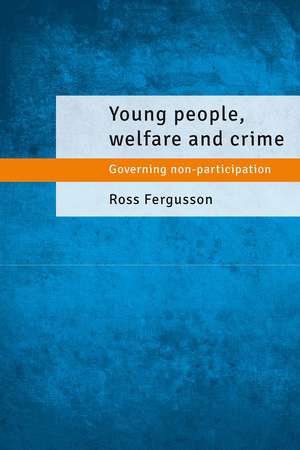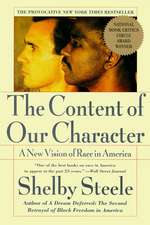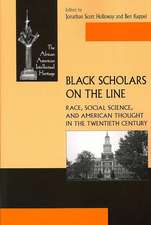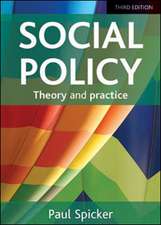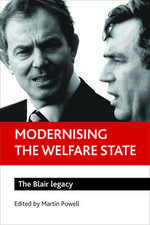Young People, Welfare and Crime: Governing Non-Participation
Autor Ross Fergussonen Limba Engleză Hardback – 23 feb 2016
Widespread youth unemployment is rapidly becoming a major—and seemingly endemic—problem around the world. And, increasingly, young people themselves are being blamed, their nonparticipation in the workforce criminalized. Ross Fergusson here mounts a powerful critique of current approaches to youth unemployment, reexamining its causes and consequences from a wide range of perspectives and revealing the structural and cultural problems that underlie it. It will be essential for anyone working with or trying to address the problems of youth today.
Preț: 778.71 lei
Preț vechi: 1011.31 lei
-23% Nou
Puncte Express: 1168
Preț estimativ în valută:
149.01€ • 155.97$ • 124.02£
149.01€ • 155.97$ • 124.02£
Carte tipărită la comandă
Livrare economică 31 martie-14 aprilie
Preluare comenzi: 021 569.72.76
Specificații
ISBN-13: 9781447307013
ISBN-10: 1447307011
Pagini: 224
Dimensiuni: 152 x 229 x 23 mm
Greutate: 0.59 kg
Editura: Bristol University Press
Colecția Policy Press
ISBN-10: 1447307011
Pagini: 224
Dimensiuni: 152 x 229 x 23 mm
Greutate: 0.59 kg
Editura: Bristol University Press
Colecția Policy Press
Notă biografică
Ross Fergusson is a senior lecturer in social policy at the Open University, UK.
Cuprins
Detailed contents
List of figures and tables
List of abbreviations
About the author
Acknowledgements
Part One: The crisis of non-participation
1. Crises of non-participation
Part Two: Work, welfare and crime: research and policy
2. Young people and non-participation: discourses, histories, literatures
3. Non-participation, wages and welfare
4. Non-participation and crime: constructing connections
5. Unemployment, crime and recession
Interlude: Interpretive review
Part Three: Theorising non-participation
6. Lines of division, points of entry: two theories
7. Theorising the non-participation-crime relationship
Part Four: Criminalising non-participation
8. The advance of criminalisation
9. Review and concluding comments
List of figures and tables
List of abbreviations
About the author
Acknowledgements
Part One: The crisis of non-participation
1. Crises of non-participation
Part Two: Work, welfare and crime: research and policy
2. Young people and non-participation: discourses, histories, literatures
3. Non-participation, wages and welfare
4. Non-participation and crime: constructing connections
5. Unemployment, crime and recession
Interlude: Interpretive review
Part Three: Theorising non-participation
6. Lines of division, points of entry: two theories
7. Theorising the non-participation-crime relationship
Part Four: Criminalising non-participation
8. The advance of criminalisation
9. Review and concluding comments
Recenzii
"Every now and then you get to undertake a book review of a truly excellent book. This has been one of those times. . . . This book excels on all levels."
"A wide-ranging, knowledgeable, and sophisticated attempt to offer fresh insights and, indeed, to offer a strong challenge to the ways in which the young are marginalized and manipulated by dominant social forces."
“Fergusson shows that there is not just an economic and social crisis that affects the young in rich-world countries but also a crisis in our understanding of how and why it has come about. His book is a major new critique of several theories. It suggests what can be salvaged from current academic misunderstandings, and how academics can better work with others to begin to turn the tide for young adults who are treated as if they are no longer needed, or are useful only for menial work of little real value.”
“Educational underachievement and exclusion, diminishing labor-market opportunities and wholesale criminalization comprise the adverse conditions within which complex youth-adult transitions are increasingly defined and disfigured internationally. Fergusson’s timely publication engages with these conditions empirically and theoretically with a level of analytical precision and authority that will make it an indispensable source for sociologists, social policy analysts, and criminologists.”
“This is an exciting book. Too often scholarly debates and policy thinking about young people take place in separate disciplinary fields, limiting the theoretical potential for understanding. Here Fergusson has produced an important and novel contribution to the way that we should think about the exclusion of young people. The book is to be commended for its ambition in bringing together theory and research from youth studies, criminology, sociology, and social policy, better to understand work, welfare, and crime.”
“Fergusson has important things to say. His book cuts through much muddled thinking about young people’s non-participation. It challenges dominant policy discourses about contemporary youth and much academic thinking and offers an original and critically informed analysis which disrupts the traditional disciplinary restrictions which limit our understanding of the lives of young people on the margins of education and work.”
“Working in sophisticated fashion across disciplines and theoretical approaches, this unique—and very welcome—book provides much-needed contemporary insights into the complex relationships among youth unemployment, welfare, and crime.”
